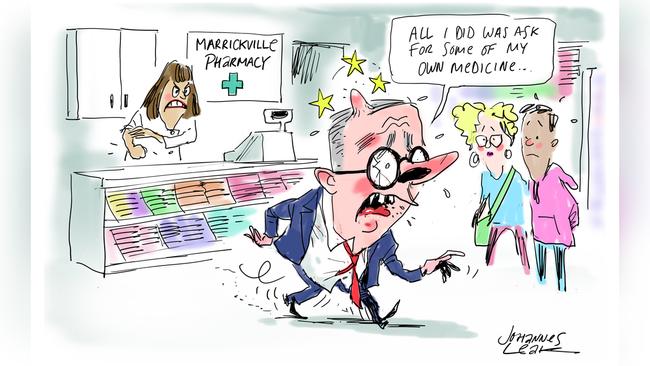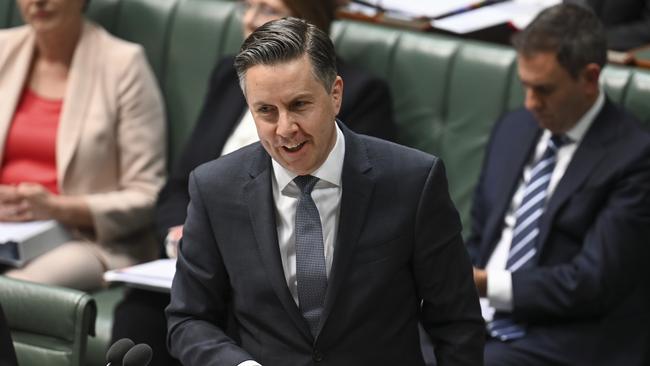PM’s pharmacist warns double dispensing will hit pharmacies and patients ‘like a wrecking ball’
Anthony Albanese’s local pharmacist and ALP member Adele Tahan has warned that the government’s 60-day dispensing policy will hit pharmacies and patients ‘like a wrecking ball’.

Anthony Albanese’s local Sydney pharmacist and ALP member Adele Tahan has warned that the government’s 60-day dispensing policy will hit pharmacies and patients “like a wrecking ball”, as new industry modelling warns of mass closures and 20,000 jobs lost.
Ahead of the final parliamentary sitting week before the winter break, the Pharmacy Guild of Australia will release modelling on Monday that says 665 pharmacies will be forced to close and that new rules starting on September 1 will cut $4.5bn in dispensing fees over four years.
Ms Tahan, who operates Adore Compounding Pharmacy in inner west Rozelle and ran for the ALP at the 2021 Inner West Council election, told Mr Albanese during a meeting in his electorate office last month that the double-dispensing policy would “force pharmacists to lay off staff and cut opening hours”.

“I’ve been an ALP member for many years and looked after the Prime Minister as his pharmacist for at least three years,” Ms Tahan, a Pharmacy Guild NSW branch vice-president, told The Australian.
“I joined the Labor Party and became a community pharmacist for the same reason: to help people and that’s why I’m so dismayed by the Albanese government’s decision to introduce 60-day dispensing.
“Potentially, pharmacists might have to make the heart-wrenching decisions to close their doors. Furthermore smaller pharmacies and pharmacies in rural, country and regional areas will be hardest hit with this new rule.”
A spokeswoman for the Prime Minister referred The Australian to comments made by Mr Albanese in parliament on May 31 about his meeting with Ms Tahan.

“I sat down with the vice-president of the pharmacy guild in my electorate office just a couple of weeks ago. I’ll continue to engage with community pharmacies, including in my own area, as will the Health Minister,” Mr Albanese told parliament.
“And every member will because every member here knows the important role that community pharmacists have.
“But what we won’t do is ignore completely … the cost-of-living pressures on people who have a health condition that requires regular drug treatment for the rest of their lives. Why should they pay double what they need to?”
The dispensing policy has come under fire from pharmacists and inside Labor ranks over concerns the government made the change without modelling its impact.
The Department of Health has contracted McKinsey and University of Technology Sydney to “support the department’s analysis” of the policy, after it was announced in April.
Health Minister Mark Butler has said analysis was undertaken by the Department of Prime Minister and Cabinet’s Office of Impact Assessment (OIA), which found there would be “substantial benefits” to patients.
However, the analysis also estimated pharmacies would lose on average up to $158,000 a year due to reduced dispensing fees, with OIA executive director Jason Lange telling the Health Department that more consultation with stakeholders could have taken place.

The pharmacy guild, which wants the government to delay implementation of the policy, is preparing a nationwide blitz targeting marginal seats with robocalls, multimedia advertising and grassroots campaigns across community pharmacies.
The modelling was prepared by economist Henry Ergas, a columnist for The Australian, drawing on a technical report written by Tulipwood Advisory and Griffith University’s Relational Insights Data Lab.
It says the policy will cause the loss of thousands of community pharmacy jobs over four years, 665 pharmacy closures (with a further 900 at risk), pharmacies not opening on weekends or late, and the end of free services including blood pressure monitoring and weight checking, home delivery of medication and asthma monitoring.

The Albanese government says its policy will help at least six million Australians halve their medicine costs and save more than $1.6bn over four years, with fewer visits to their GP and pharmacist.
The Ergas report says “the pressures are likely to affect the viability of regional, rural and remote community pharmacies especially acutely, although urban pharmacies will also be affected”.
“The related job losses in the community pharmacy sector will also be significant and a proportion of these will be either long-term or permanent, with older community pharmacy workers (both community pharmacists and community pharmacist assistants) potentially leaving the labour force altogether,” the report said.
“The greatest risk, however, is that the most vulnerable people in the Australian community will suffer from the MDQ (maximum dispensing quantity) policy change.
“This includes consumers managing multiple health issues, the elderly, those with mobility issues and those in regional Australia that may rely more heavily on their local community pharmacy (and community pharmacist) than their counterparts in urban areas.”








To join the conversation, please log in. Don't have an account? Register
Join the conversation, you are commenting as Logout